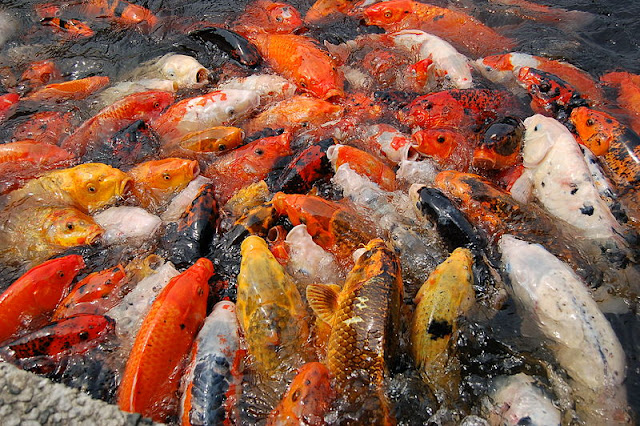 |
| What causes pond water problems and how to avoid them |
.
Unfortunately, as is so often in life, there is an element of maintenance which in the case of ponds can’t be ignored. Turning a blind eye to this can not only have a severe effect on the health of your pond but also your fish, and your enjoyment of the garden as a whole.
It’s often believed that winter is the most hazardous time for your pond life, and why wouldn't it be. Not only does it have to cope with toxic gases released from rotting debris, percussive shock waves as enthusiastic fish keepers attempt to break the ice, but your prized fish will probably be frozen mid-swim. Strange as it may seem the most life-threatening period of the year for your ponds livestock is actually the height of summer. So in light of this we’ll discuss the common aquatic problems you’re likely to encounter and how to avoid them.
Higher summer temperatures are known to cause a drop in oxygen levels as warm water is less able to hold dissolved oxygen when compared to cool water. This is exasperated by the high light levels at this time of year, which when combined with natural seasonal algae blooms creates an environment where oxygen demand is at its greatest. This is compounded at night when, in the absence of sunlight, your aquatic plants and algae stop their oxygen producing photosynthetic process and instead consume dissolved oxygen for respiration competing with the fishes needs and adding more carbon dioxide to the water.
This problem becomes worse in deeper ponds where the top few feet of water warms up quickly. Because this upper layer is warmer and therefore lighter, it tends not to mix with the cooler, deeper water which can then stagnate with decaying organic matter. This deep layer will remain un-oxygenated but a sudden heavy rainfall or a strong cold front can rapidly cool the surface layer of warm water. This then sinks mixing with the deeper stagnant water, and reduces the oxygen levels throughout the pond.. This ‘turn over’ of water has the added effect of releasing all of the dissolved oxygen from the upper layer of the pond into the atmosphere causing catastrophic oxygen depletion.
Symptoms of oxygen depletion may include fish gulping at the water surface or near the pond edges. In severe cases this can cause the death of your fish beginning with your larger ones first, but all sizes of fish can be affected. In addition, the colour and clarity of your pond water may change, and worse still, you may have a release of a foul smelling odor. The last thing you want on a warm summer’s day!
Having an appropriately sized pump running, preferably in conjunction with a pond filter, should avoid catastrophic oxygen depletion. However check mechanical filters daily and biological filters every few weeks. Should they need cleaning, do so in accordance to manufacturer instructions or refer to the section below on how to keep biological filters in top condition. Keep and eye out for evaporation on a weekly basis during the summer, topping up with water when necessary. Any more than 1-2" water loss per week could indicate a more serious problem, such as liner or tubing leaks. Make a point of checking all pumps, waterfall, fountains and their connections just to be on the safe side.
Main image credit - Arden https://creativecommons.org/licenses/by/2.0/deed.en
.
For further information click onto:
Freshwater Trust
HOW DO HIGH NITRATE LEVELS AFFECT FISH HEALTH?
HOW DO HIGH NITRITE LEVELS AFFECT FISH HEALTH?
HOW TO ATTRACT WILDLIFE INTO THE GARDEN WITH A POND
HOW TO MAINTAIN AND LOOK AFTER BIOLOGICAL SPONGE POND FILTERS
HOW TO MAINTAIN AND LOOK AFTER A HEALTHY POND
Native British Pond Plants
WHAT CAUSES POND WATER TO GO FROTHY?







No comments:
Post a Comment